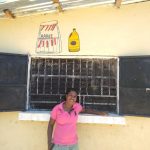 In 2012 Macdalla Saint Vil met a loan officer from Esperanza and gratefully accepted the opportunity to change her children’s future. With her first loan she started selling products on the streets in a “mobile cafeteria.” Learning more about business and finance as she took out larger loans, Macdalla kept expanding her business, first to grow and sell passion fruit and cacao, then buying a lot to build a cement house. Her new home now also houses her store and business.
In 2012 Macdalla Saint Vil met a loan officer from Esperanza and gratefully accepted the opportunity to change her children’s future. With her first loan she started selling products on the streets in a “mobile cafeteria.” Learning more about business and finance as she took out larger loans, Macdalla kept expanding her business, first to grow and sell passion fruit and cacao, then buying a lot to build a cement house. Her new home now also houses her store and business.Microfinance is a banking service which exists to serve the material poor in emerging economies. Through this lending process, loans are distributed to entrepreneurs for investment in their business.
learn more
